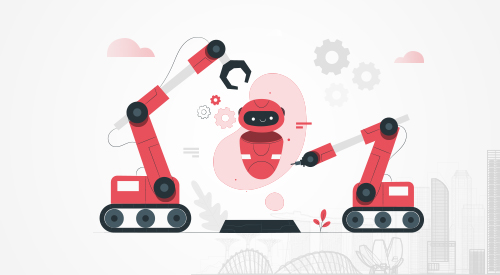

Intelligence automation has emerged as a transformative force. It combines artificial intelligence (AI) and machine learning (ML) techniques to automate complex tasks and decision-making processes. Intelligence automation enables machines and systems to learn from data, adapt to changing conditions, and perform tasks with minimal human intervention. Singapore has established itself as a prominent technology hub, both regionally and globally. In this blog, we will take a look at how Intelligence automation in Singapore aims to enhance its industries, improve productivity, and create new opportunities for growth.The country’s commitment to innovation and technology adoption positions it at the forefront of the global movement towards automation and intelligent systems.
Innovate with Niveus In Expanding Intelligent Automation In Singapore
The State of Intelligence Automation in Singapore
The city-state’s commitment to technological advancements is evident in various initiatives, such as the Smart Nation vision and the development of AI-driven solutions. With its strategic location, strong infrastructure, and supportive government policies, Singapore has attracted numerous tech companies, startups, and research institutions. It has fostered a vibrant ecosystem that encourages innovation, entrepreneurship, and the adoption of cutting-edge technologies. Singapore has invested in building a robust digital infrastructure, promoting research and development, and fostering collaborations between the public and private sectors. These efforts have propelled Singapore’s reputation as a leading hub for technological innovation and experimentation.
Business leaders in Singapore recognize the significance and advantages of implementing robotic process automation (RPA) to thrive in the current dynamic business landscape. However, there is room for improvement in effectively communicating RPA strategies to employees and helping them understand how this adoption will enhance their work experiences. Moreover, many leaders face challenges when attempting to scale RPA-enabled digital workforce programs across their organizations to achieve higher return on investment (ROI).
A recent study revealed that 78 percent of local business leaders believe their employees would trust working alongside a digital workforce. However, 44 percent of local knowledge workers expressed concerns about potential job losses in the next three years, despite growing more comfortable with RPA technology. Additionally, while 73 percent of business leaders believe their employees appreciate the opportunities presented by RPA and automation, it seems they may have overestimated, as only 65 percent of local knowledge workers share the same level of excitement about these prospects.
With the advent of Generative AI solutions, businesses need new and advanced strategies for modernization in order to stay ahead of the curve. New frontiers for Intelligence automation in Singapore has become a requirement across sectors. In 2019, Singapore launched its National AI Strategy, and recently, the government announced its collaboration with Google Cloud at the Google Cloud Summit. The Smart Nation and Digital Government Office (SNDGO) partnered with Google Cloud to introduce the Artificial Intelligence Government Cloud Cluster (AGCC). This platform aims to accelerate AI adoption in Singapore’s public sector, facilitate local research in applied AI, and support the growth of the local AI startup ecosystem. The AGCC is hosted in a dedicated cloud computing environment within Singapore, allowing government agencies to leverage Google Cloud’s AI technology stack and partner ecosystem to build and deploy scalable and impactful AI applications quickly, securely, responsibly, and cost-effectively.
An Overview of the Industries Adopting Intelligence Automation in Singapore
Intelligence automation in Singapore has been at the forefront of revolution across various industries. Here is an overview of some key sectors that have embraced intelligence automation in Singapore:
- Manufacturing and Logistics: The manufacturing sector in Singapore has integrated automation technologies extensively. Intelligent robots and automated systems are used for assembly, quality control, and inventory management, enhancing efficiency and productivity. In logistics, intelligent automation is employed for optimizing warehouse operations, inventory tracking, and last-mile delivery, ensuring smooth and timely supply chain management.
- Finance and Banking: Singapore’s finance and banking industry has leveraged intelligence automation to streamline processes, improve customer service, and enhance security. Robotic process automation (RPA) is utilized for automating repetitive tasks such as data entry, compliance checks, and transaction processing. Chatbots and virtual assistants are employed to provide personalized customer support and assist with basic financial inquiries.
- Healthcare and Medical Services: The healthcare sector in Singapore has embraced intelligence automation to enhance patient care and operational efficiency. Intelligent systems are utilized for medical data analysis, diagnosis, and treatment planning. Robotic systems assist in surgical procedures, ensuring precision and minimizing invasiveness. Telemedicine platforms and remote monitoring technologies enable remote consultations and continuous patient monitoring.
- Retail and E-commerce: Retailers and e-commerce businesses in Singapore are adopting intelligence automation to enhance the customer experience, optimize inventory management, and enable personalized marketing. Intelligent systems are utilized for demand forecasting, dynamic pricing, and personalized product recommendations. Robotics and automation are employed in warehouses for efficient order fulfillment and inventory tracking.
- Transportation and Logistics: The transportation and logistics industry in Singapore has integrated intelligence automation for various applications. Autonomous vehicles and drones are used for transportation and last-mile deliveries, reducing human intervention and improving efficiency. Intelligent systems are employed for route optimization, real-time tracking, and predictive maintenance, ensuring smooth operations and cost optimization.
- Energy and Utilities: The energy and utilities sector in Singapore has implemented intelligence automation to optimize energy generation, distribution, and consumption. Intelligent systems and IoT devices enable real-time monitoring, data analysis, and predictive maintenance in power plants and smart grids. Automation technologies are utilized for energy optimization, load management, and demand response, promoting sustainability and efficient resource utilization.
These are just a few examples of industries in Singapore that have embraced intelligence automation to drive innovation, improve productivity, and stay competitive in the rapidly evolving digital landscape.
The Impact of Digital Transformation on the Adoption of Intelligence Automation
Digital transformation has played a pivotal role in driving the adoption of intelligence automation in Singapore. Here are some key impacts of digital transformation on the adoption of automation:
- Data Availability and Analysis: Digital transformation has led to the proliferation of data through various sources and devices. The availability of vast amounts of data provides a rich resource for training intelligent automation systems. Advanced data analytics and machine learning algorithms enable businesses to extract valuable insights from this data, facilitating the development of intelligent automation solutions that can make data-driven decisions and perform complex tasks.
- Connectivity and Integration: Digital transformation has enabled seamless connectivity and integration between systems, devices, and processes. Through the Internet of Things (IoT) and application programming interfaces (APIs), disparate systems can communicate and exchange data, creating a unified ecosystem. This connectivity enables intelligent automation to leverage data from multiple sources, enhancing its capabilities and applicability across different domains.
- Cloud Computing and Scalability: The advent of cloud computing has revolutionized the scalability of automation solutions. Cloud platforms provide the computational power and storage required for running sophisticated algorithms and handling large volumes of data. This scalability allows businesses to easily scale up or down their automation systems based on demand, making it more accessible and cost-effective for organizations of all sizes.
- Enhanced User Experience: Digital transformation has driven a shift towards enhancing the user experience. Intelligent automation technologies, such as chatbots and virtual assistants, provide personalized and interactive user interfaces, improving customer engagement and satisfaction. These technologies automate routine interactions and provide timely, accurate responses, leading to improved customer experiences and increased operational efficiency.
- Process Optimization and Efficiency: Digital transformation has highlighted the need for streamlined and efficient processes. Intelligent automation allows businesses to automate repetitive and rule-based tasks, freeing up human resources to focus on more value-added activities. Automation technologies optimize processes, reducing errors, cycle times, and operational costs. These efficiency gains from automation are a key driver for organizations looking to improve productivity and competitiveness.
- Agility and Adaptability: Digital transformation has accelerated the pace of change in business environments. Intelligent automation provides agility and adaptability to respond to rapidly changing market dynamics and customer expectations. With automation, businesses can quickly adapt their processes and operations, making them more agile and responsive to market demands.
In conclusion, Intelligence automation in Singapore has positioned the APAC giant as a leading technology hub. The impact of digital transformation has accelerated the adoption of automation, leading to increased productivity, efficiency, and innovation across industries. While concerns about job displacement exist, Singapore has implemented initiatives to address workforce re-skilling and job creation. The future implications of intelligence automation in Singapore are promising, with potential for further productivity gains, job opportunities, and societal improvements. By balancing the benefits of automation with workforce well-being, Singapore is poised for continued growth and success in the automated era.











